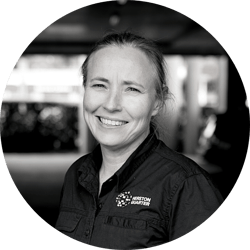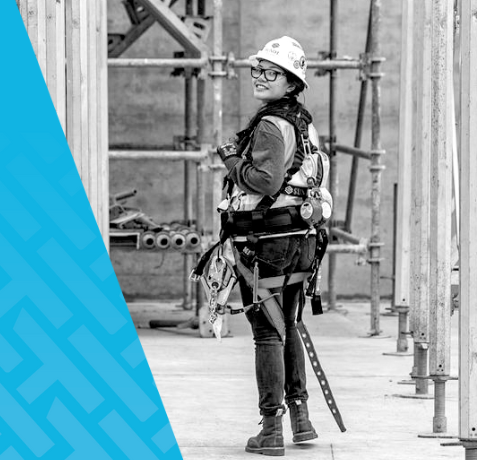In addition to International Women’s Day on Wednesday 8 March, this week is also the 25th annual Women in Construction Week. HammerTech spoke with three women in construction who have worked their way up what has been an often-tough ladder. Shannon Scott, the National HSE Co-ordinator at Hutchison Builders, Aimee Elliott, the HSEQ Co-ordinator at Kane Constructions and Nilcan Ozan, HSE Administrator at Mirvac talk about how the industry has, and continues to change.
The theme for this year’s Women in Construction Week is Many Paths, One Mission – which aims to shine a light on the different journeys women have taken to build their careers in the construction industry.
Despite many changes to the construction industry, particularly over the past few years, according to the ABC, in 2022 women made up just 13% of the building and construction workforce and of those only 2% are in trades with the other 11% being in administration and support roles.
The National Association of Women in Construction (NAWIC) has an ambitious goal for women to make up 25% of the industry by 2025.
Many companies are pushing for change internally but it is also encouraging to see Government recognising the imbalance and, more importantly, doing something about it.
Victorian government backs change with quotas
Last month the Victorian Government introduced a new policy to improve gender equality in the building, infrastructure and civil engineering sectors. Effective from 1 January this year the Government’s Building Equality Policy mandates that on new government projects valued at $20 million or more female representation is at least 3% for each trade role, 7% for each non-trade position and 35% of management, supervisor and specialist labour roles. It also mandates that 4% of labour hours for apprentices and trainees will need to be performed by women.
Aimee Elliott, the HSEQ Co-ordinator at Kane Constructions, a privately owned commercial construction company, welcomed the initiative.
“I’m lucky to work for an organisation that was already working to increase women in construction. From our perspective it is about hiring the right person as opposed to the right “man for the job”. Kane has also increased the Consider Construction campaign with more school and youth group visits and from these we have seen an increase in work experience students.”
Nilcan Ozan, HSE Administrator at Mirvac, said gender quotas are useful in setting a minimum standard but they are only a part of what needs to be done to work towards gender equality across our industry.
“The Mirvac team reports regularly against a range of diversity and inclusion targets which look right across the employee lifecycle including gender equitable recruitment practices; ensuring a diverse pipeline of talent and successors; and monitoring promotion, remuneration and turnover data for any signs of bias.”
The needle has shifted, but more needs to be done
Shannon Scott, the National HSE Co-ordinator at Hutchison Builders, said the attitude towards gender diversity over the past five years has improved but more needed to be done.
“The needle has shifted in the last 5 years, however there is still room for improvement. When we start to open people’s minds that there can be multiple attributes that make a person diverse, it will improve greatly. When you have people with multiple identity attributes, they have a diversity of experience, which brings diversity in thinking.
“I started in the industry in the late 90s and the views of who could be in the industry were very rigid. We are now starting to open up that anyone can do any job based on drive, skill and knowledge - as long as they feel comfortable being themselves in their environment."
Aimee agrees that the needle has shifted “however, it is only a small shift. I don’t believe we will see a larger shift until the current students are ready for the job market.”
Nilcan believes that gender diversity in the workplace is more effective now than it has ever been.
“We are delighted with our progress and impact to date, however, our work is ongoing. The property and construction sectors have made excellent progress, but there is more to be done and Mirvac is fully committed to striving for our sector to be a place where everyone feels they belong .”
Active programs that are netting results
Shannon said Hutchies has several initiatives in place to drive diversity including its highly successful Statim Yaga (start work) program aimed at increasing First Nations employment, a social responsibility team that drives its intake and also engaging with people at a grass roots level such as young students.
“In 2012 Hutchies employed a dedicated indigenous specialist to engage and work with Aboriginal and Torres Strait Islander communities. While this focuses on indigenous training and employment it is also about increasing the cultural capability of the broader organisation.
“Hutchies wants to have a workforce as diverse as the society in which we live. We know when people from different backgrounds and experiences come together, good things happen. Our Respect & Inclusion strategy sets out our expectations on diversity and inclusivity in the workplace and the way we support each other, our industry and community at large.
“Statim Yaga has placed more than 700 Indigenous workers into the construction industry; our women in construction strategy with a dedicated Female Participation Manager that works across our project teams, clients, subcontractors, and even in schools and universities.
“We also operate our own registered training organisation, Hutchies Training, which ensures we grow the capacity and capability of our people within and those wishing to enter the industry from any walk of life. There is still lots to do and Hutchies has established a dedicated team who continue to lead change across our industry.”
Aimee said that one program having a significant impact at Kane is its education campaign targeted at school students who are starting to plan what their careers might look like.
“These programs don’t focus specifically on getting on the tools but the ways everyone can contribute to the construction industry. These pathways include design, management, operations and finance.”
For Nilcan, she is proud of the innovation at Mirvac and her company being named the world’s most gender equitable company by Equileap for the second year in a row. “We mainstreamed flexible working several years ago, we have an ongoing investment in women’s mentoring programs and we pay close attention to our gender pay parity analysis, where we have maintained a zero pay gap for like-for-like roles for the past seven years."
When looking at creating a more inclusive environment employing more women from areas such as the LGBTIQA+ community, Shannon said all elements of diversity needed to be part of the conversation.
“Many social attributes intersect and being allowed to be yourself is key. The conversation shouldn’t be just about a single attribute for example female; it needs to be inclusive of all differences and identities. We need the conversation to be about people with multiple and intersecting attributes, these can be gender, sexuality, indigenous, ethnicity, and more.
“Individuals need to be free to be whoever they want to be and be open about it and feeling comfortable that you can be yourself in this industry.”
The basics of gender inclusion must consider intersections
Aimee believes the industry as a whole needs to get the basics of inclusion right. “It starts with inclusive language – and they are simple things. Moving away from terms such as foreman and using foreperson. Starting tool boxes with “morning all” not “morning boys … and girl”. We need to look at diversifying the conversation and including voices of LGBTIQA+ and indigenous women.
“Consultation and communication isn’t just a legal obligation. It is an opportunity to include and educate all workers on site through shared experience. Amplifying the voices and minority groups can easily be achieved through toolboxes, builder’s briefs and the beloved barbecue day.”
Nilcan said it is important to raise awareness of all options available to all genders, including highlighting the disparities that have existed in the construction industry. “This raised awareness will bring both new opportunities to women and non-binary people and prevent the issues that arise from ignorance."
“Leaders at Mirvac take a proactive approach to ensure we are creating a safe, equal and respectful culture and will be clearly setting expectations and role modelling these behaviours. This is more than training and policy updates, and we are focused on prevention and protection for all our employees.”
Career pathway support for companies and allies
And what has led these three women to be leaders in their field?
It didn’t start off all roses for Shannon. “I wanted to be a tradie but it was not easy 20 plus years ago. I applied for a lot of apprenticeships and got knocked back. I ended up joining the Navy which employed me based on being me rather than on gender. At Hutchies – where I have been for more than a decade – they recognise my skills and ability, and have supported me to be myself. They offer an inclusive work environment that embraces difference and rewards individual merit – allowing to continue building my career in an industry I love being part of."
For Aimee she didn’t take a typical path into construction. “Most people move through education into construction via targeted pathways. I have a range of experience in a number of different industries that honed my leadership skills before I even considered a career in construction.
“I’m lucky to have an excellent mentor in Kim Kitchen. The opportunity to gain advice and guidance as well as the opportunity to vent whenever I need is invaluable being a female leader in a male dominated industry.”
For Nilcan, she says as a Mirvac employee she feels included. "I am being heard. My voice has value,” she said.
Find out more about Aimee, Nilcan and Shannon below, and connect with them on LinkedIn to continue the conversation.
Aimee Elliott- HSEQ Co-ordinator at Kane Constructions

Aimee is a HSEQ Coordinator at Kane Constructions leading safety across the business.
Having worked in a number of industries, Aimee brings a growth focus to safety incorporating her work with young people, women’s networks and customer service.
When she’s not frothing safety, you can find Aimee being a coffee snob across cafes in Melbourne reading a book on her Kindle.
Nilcan Ozan- HSE Administrator at Mirvac

A passionate safety professional, promoting professional development of Safety & Health within the work environment, improving safety performance, and developing cultural change through positively influencing and engaging people within all levels of an organisation.
With a background in interior design, retail management and technology solutions, Nilcan has a unique perspective in providing optimal solutions to eliminate risks and hazards.
As a safety professional, Nilcan achieves goals by sharing knowledge of best practices on Work Health Safety and Environment, always passionately seeking opportunities to continuously provide a safe work environment for all employees and guests ensuring they go home safe and healthy everyday.
Shannon Scott- National HSE Co-ordinator at Hutchison Builders

Shannon joined Hutchies in 2013 and previous to her current role of National HSE Co-ordinator Shannon operated as a site-based Safety Advisor and Team HSE Manager on a number of major projects in South East Queensland and Tasmania.
In her current role Shannon works in collaboration with Hutchies’ National HSE Manager and National Systems Manager, bringing her innovative thinking style to the team to deliver the fine-tuning finesse to suit the diverse nature of Hutchies’ business.
In this role she is charged to understand how Hutchies construction teams are using the HammerTech platform and the data that is obtained, and to engage with HammerTech to promote system enhancements that will result with better outcomes for the System, and the Users.
Shannon commenced her working career in the Australian Navy as an Electronic Technician – Weapons, and during this time was posted to a number of in-country and overseas deployments.
Upon the completion of her tenure with the Australian Navy, Shannon qualified as an electrician prior to pursuing roles in the safety arena.
Shannon has worked in the services and construction industry for more than 20 years and has a wealth of experience that has been gained from her involvement in a significant number of varied and complex projects.
Connect with these inspiring leaders on LinkedIn and to explore careers in construction consider checking out open roles at their companies here:




